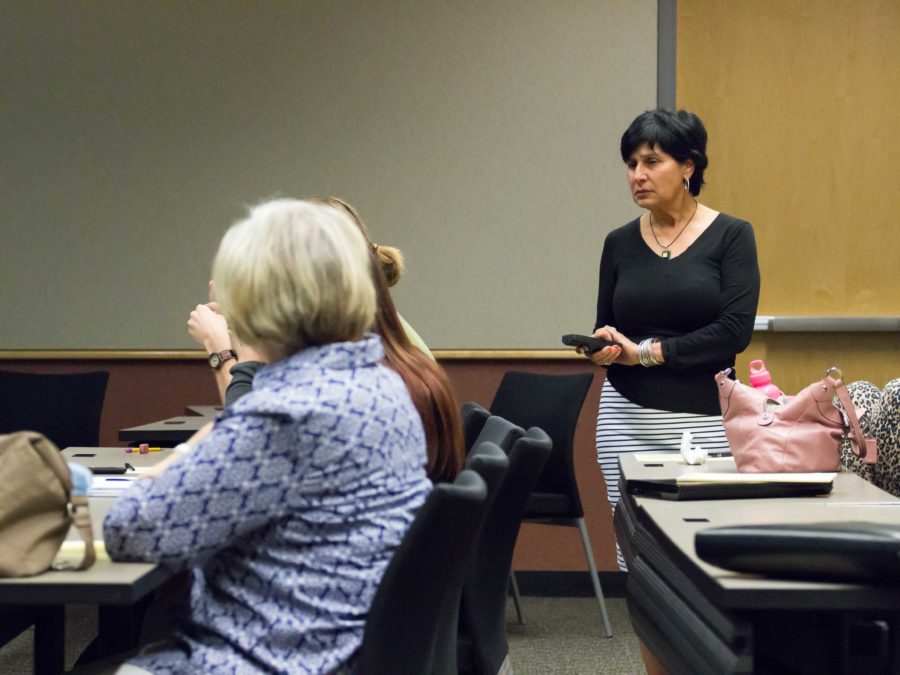Two women glance at one another; one wears a hijab and is completely covered except for her eyes, while the other woman wears a small bikini with sunglasses covering her eyes. The same thought crosses their minds: what a cruel male-dominated culture she must live in.
The cartoon sketch of these women was on display during the Feminism and Islam presentation Santa Rosa Junior College psychology professor Narmeen Nasseem held at noon March 26 in the Doyle Library.
As part of the lecture series for SRJC Women’s History Month, Nasseem discussed some of the misconceptions people have about feminism, Islam and patriarchy.
“I am Islamic. I’m a feminist. And I’m living in a patriarchal world,” Nasseem said. “I’m aware that there are misconceptions. And we’re living in a time where there is Islamophobia.”
After welcoming the 20 attendees to the event and having everyone greet one another, Nasseem asked the audience questions about each topic – feminism, Islam and patriarchy – then asked which religions have influenced them personally.
Along with the personal accounts attendees shared about their experiences with religion, Nasseem talked about her own religious background. She had Muslim parents, Hindu and Buddhist friends and attended a Catholic school in Southeast Asia.
“I found myself praying in many different languages and praying to different deities,” she said.
When asked about her own stance on religion, she said, “I am not religious in the sense that I don’t follow any one of the religions, but I sure do have a clear sense that religion plays a very important role in society. The reason that I say that is because I think every religion has some fabulous guidelines as to how we can coexist.”
The problem with religions like Islam, Nasseem argues, is human interpretation.
“To me, the religion itself serves a real, critical role in our functioning,” she said. “But the way that we’ve interpreted it to where we justify the ugliness that we do to one another; that’s what I mean, it’s like no, I’m not a religious person.”
The discussion led to religion’s role and influence on feminism, especially in Muslim countries.
“Through religion, feminism has been railroaded,” Nasseem said.
However, Naseem argues that Islam has also had a positive influence on feminism. Her lecture slides stated that under Islamic Law, education was made a sacred duty for girls and gave women the right to own and inherit property. It also stated that the Qu’ran did not invent or introduce patriarchy, but rather the Islamic scriptures were written at a time in which the dominant culture was Middle Eastern patriarchy.
Nasseem then discussed how the definition and perception of feminism itself varies throughout different cultures.
“For us as Westerners to look at Easterners and go, ‘God, first get rid of all this covering that you’re doing,’” she said. “That’s egocentrism in us… that you gotta do it our way because, you know, this is what feminism is.”
Nasseem argued that for people to make any kind of change, they must function within the environment instead of putting it down.
“Your cultural norms are not the norms of the world,” she said.
Nasseem received very positive feedback about her presentation.
“I was just really happy to see the number of people who attended,” Naseem said. “I was disappointed to see, again, so few men in the audience as though feminism is something that is the domain of females.”
After attending the event, SRJC student Harmony Caponio, 25, said, “It sparked a really good conversation on feminism. We are all in common agreement. We just all interpret it differently.”




